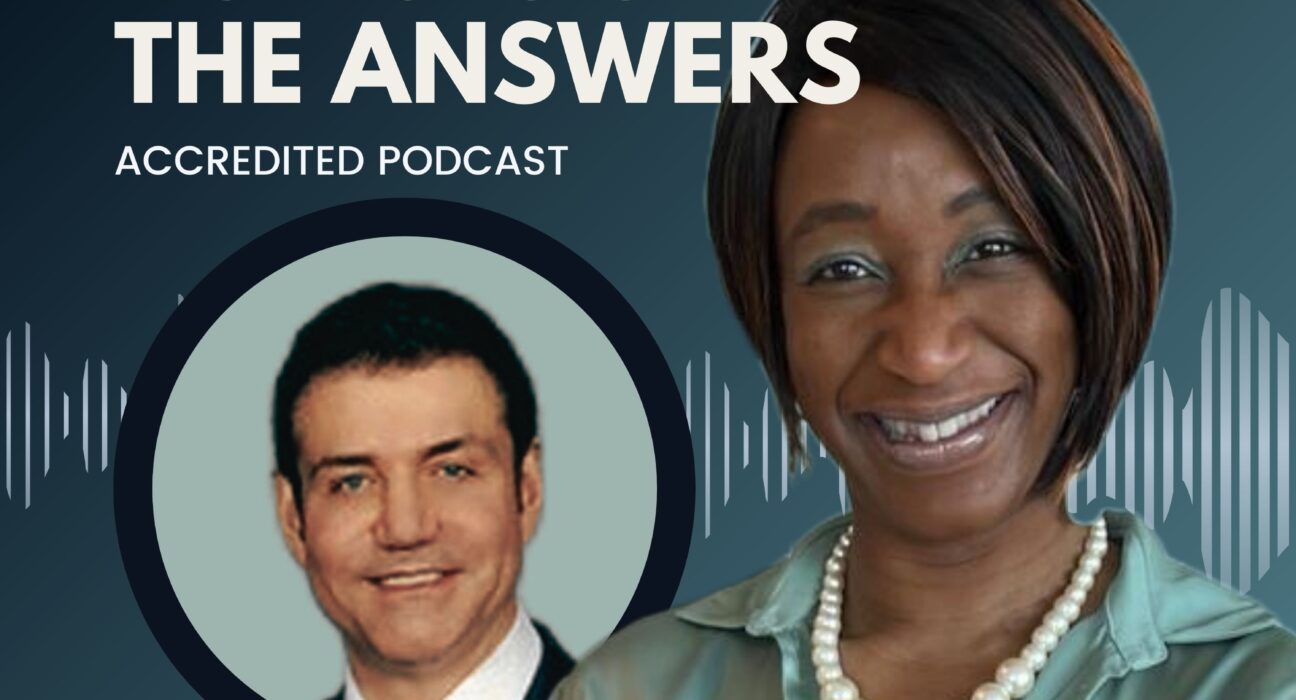
In this episode, Dr. Ric Arseneau delves into chronic fatigue syndrome (CFS) and its connection to long COVID. He highlights widespread misconceptions, the medical community’s lack of understanding, and the need for increased funding and awareness to address the significant impact of post-viral syndromes like CFS.
Guest – Professor Ric Arseneau MD
Note: The podcast has no bias. All conflicts of interest are highlighted with individual guests.
Healthcare Professionals | Earn 0.5 Certified Mainpro+® Credits! Please register/login to claim your CPD/ CEU credits.
Podcast Overview:
Ric Arseneau discusses the misconception and underfunding of chronic fatigue syndrome (CFS) and its overlap with post-viral syndromes like long COVID. He emphasizes the need for better medical understanding, distinctions between post-COVID conditions, and increased awareness of CFS as a real, debilitating illness.
Key Points:
- Misconceptions about Chronic Fatigue Syndrome (CFS) and Fibromyalgia
- Long COVID as a Post-Viral Syndrome
- Medical community’s misunderstanding of post-COVID conditions
- Economic and societal impact of CFS
- Gender bias in medical treatment of CFS
- Need for clearer medical definitions and distinctions between post-COVID and long COVID conditions
- Importance of addressing underfunding and societal costs of CFS
DISCLAIMER: The information in this podcast is provided for informational purposes only. You should not use any information discussed in this podcast and related materials to make medical or healthcare related decisions. Always consult a your physician or other qualified health care provider with regards to diagnosing managing your medical condition. Any medications or treatments, including any discussed in this podcast, should be initiated and managed by a qualified health care professional.
Podcast Transcript:
Healthcare Professionals: Please note to claim Certified CPD / CEU credits toward your medical license (Canada & reciprocal CPD/CEU Worldwide), you will need to register or log in.
Episode 14 – ME/CFS- What is it? ft. Professor Ric Arseneau MD
[00:00:00] Funmi Okunola: The information in this podcast is provided for informational purposes only. You should not use any information discussed in this podcast and related materials to make medical or healthcare related decisions. Always consult your physician or other qualified healthcare providers with regards to diagnosing and managing your medical condition. Any medications or treatments, including any discussed in this podcast, should be initiated and managed by a qualified healthcare professional
Funmi Okunola: Welcome to Long Cover the Answers. Today’s episode is entitled Myalgic Encephalomyelitis or Chronic Fatigue Syndrome, otherwise known as MECFS. I’d like to introduce Professor Rick Arsenault. Professor Arsenault is a clinical professor at the University of British Columbia in Vancouver, Canada, and a specialist in internal medicine with expertise in ME CFS, fibromyalgia and long COVID.
He was the Physician Lead for the Provincial ECHO Education Programme for Long Covid in BC and was formerly the Director of Programme Planning of the BC Women’s Hospital Complex Chronic Diseases Programme in Vancouver. Welcome, Rick. Thank you.
Rick, do you have any conflicts of interest to declare?
Ric Arseneau: None, thank you. Professor
Barceneau,
Funmi Okunola: Rick, could you please tell us how you became interested in chronic complex diseases such as MECFS?[00:01:00]
Ric Arseneau: So I just see it as an extension of my work as an internist. I’ve always liked complex multi system diseases. And over time, I became the go to guy in our division for anything that was unexplained, weird, wonderful. And so a lot of patients, got referred to me and I learned a lot there. from my patients and over time, , just through pattern of referral, got, an interest and expertise in the area.
Funmi Okunola: What is MECFS?
Ric Arseneau: So me CCF S is a complex chronic multisystem disease of unknown etiology. We do know that certain people are more prone to get it, like patients who have a family history of me, fibromyalgia or related disorders, patients who’ve had adverse childhood experiences. And genetics.
But [00:02:00] usually what happens is even in identical twins, only 50 percent of patients will both get ME. So there’s definitely something in the environment that triggers it. And that trigger is usually some sort of overwhelming stressor. And the three main categories are infectious stressor, which is why we see post viral ME.
And then we see it also as a result of physical injuries like car accidents, but also as a result of psychological overwhelm, because it is in the same family as PTSD.
Funmi Okunola: Could you describe, some of the symptoms and signs of ME CFS?
Ric Arseneau: So there are over 200 symptoms that have been described in me, which can make it very confusing to physicians and patients. But , if you look at the forest rather than the trees, those symptoms fall into five major categories.
There’s fatigue. With post exertional malaise, there’s pain, sleep disturbance, cognitive [00:03:00] symptoms, or what patients call brain fog, and then weird and wonderful unexplained symptoms. And those include mostly brain symptoms, autonomic dysfunction, and gut symptoms, although there’s a whole host of them. So basically fatigue, pain, sleep disturbance, brain fog, and unexplained symptoms.
Funmi Okunola: The deep phenotyping of post infectious ME CFS study released online this month in Nature Communications seems to imply that prolonged infection from, say, a bacterial virus alters our immune system and gut microbiome.
Ric Arseneau: Yes.
Funmi Okunola: In ME CFS sufferers, they kind of said this leads to a chemical alteration in the brain and nervous system, so that part of the brain that controls motor actions fails to function adequately, leading to fatigue and post exertional malaise.
Do you agree with their findings?
Ric Arseneau: That’s basically the main theories right now is that some sort of overwhelming stressor, like an infectious [00:04:00] infection causes brain-based changes, and they’re usually identified at the level of the glial cells and the glial cells. What happens is that they become activated and so when I talk to patients, I say that the glee is gone out of the glial cells and they’re unhappy.
Mm. And so that they produce inflammatory cytokines. What happens is patients are stuck in a pattern where that cycle of activation can’t be turned off. Because normally what would happen is with a stressor, you’d have an activation, you’d have resolution of the stressor, and then you’d have the body go back to baseline.
What happens with ME CFS long COVID fibromyalgia is a switch gets stuck in the on position. And so that you can’t turn off this. The cycle of glial activation, which leads to activation of the fight or flight, system and dysautonomia. Immune changes, [00:05:00] inflammatory changes and a whole bunch of, changes downhill from the brain based changes.
Our best understanding right now is that it’s a neuroinflammatory condition.
Funmi Okunola: Okay, and so how do, patients present to you? How do people present to you with , this syndrome? I mean, practically speaking, is there classification or? Or grouping of people that present
Ric Arseneau: They don’t usually present to me because I, do secondary and tertiary care.
And unfortunately, the trajectory for many of these patients is. , a bunch of symptoms within that 200 range, which overwhelms their physicians, which leads to medical gaslighting or, , overwhelming amount of investigation with no, , resolution of the problem. , I’ve had some patients see as many as 27 different specialists in this province without getting an answer.
Luckily with education that has changed over the last couple of decades and patients are being routed [00:06:00] to the right care much earlier on, but patients usually present with fatigue, sleep disturbance, brain fog, pain. and unexplained symptoms, but depending on how they choose to focus on those, symptoms, because our system is really not set up to help patients with multi system diseases.
Most patients are only allowed to present with one to three symptoms to their primary care physicians. Most of my patients have 20 to 40 symptoms. And then when they get sent to a specialist, the specialist is not interested in anything except the lens through which they want to see neurologic disease, cardiac disease, respiratory disease.
And so patients are often left, uh, very unsatisfied despite the fact that they do access a lot of medical care.
Funmi Okunola: So what at the moment is the average time scale, for someone suffering with chronic complex disease to be [00:07:00] diagnosed?
Ric Arseneau: Don’t know right now, but the last data that we have is from 2015 and the average at that time was five years.
very much. There’s a paper that came out recently on POTS, postural orthostatic tachycardia syndrome, and that also showed five years. It also showed that over 90 percent of those patients received a psychiatric diagnosis before they got the correct diagnosis. And this was a study of Canadian and American cardiologists.
Funmi Okunola: So personally, as a family physician or GP myself, I don’t feel confident in diagnosing ME CFS or fibromyalgia and until I started to do lots of research, was at a loss at managing, these types of people. And I know my colleagues were saying, what would be your advice with regards to A family physician approach to, managing and diagnosing these patients.
Ric Arseneau: I think there’s a couple of rules of thumbs that serve you well. [00:08:00] So when I teach my residents, I often ask them, I say, what’s your one question that you want to ask a fibromyalgia patient or one question that you want to ask a chronic fatigue patient? that rules it out. So the one question that rules out fibromyalgia is widespread pain.
If you don’t have widespread pain, you don’t have fibromyalgia, so you go down a different route. If you have fatigue but no post exertional malaise, and so post exertional malaise, Patients will describe that as a crash as soon as they do too much, even by just a bit, they crash and it takes them a day, two days, three days a week to recover.
So without post exertional malaise, there’s no chronic fatigue syndrome and without widespread pain, there is no fibromyalgia. So that’s your entry point. After that, it’s the five categories you listen for, fatigue, pain, sleep disturbance, brain fog, and unexplained symptoms, especially autonomic, GI, and neurologic.
And that’ll get you [00:09:00] really far. I, if you go to my website, which you can see my name here on the screen, Dr. Rick Arsenault, that’s the website, drrickarsenault. ca, without the spaces in the dot under resources. I have put together a, primary care toolkit for family doctors, and it gives us advice on long covid chronic fatigue syndrome, fibromyalgia.
There’s also 2 videos I participated in the long covid, echo for New Mexico, and I did a primary care toolkit for them. It’s also the same toolkit I use for the CME at St. Paul’s Hospital. So that’s all available for family doctors. And then I think that, for the most part, it’s education. And so if you look at our website, you’ll see that we have a YouTube channel.
I invite special lecturers to come and talk about various topics. 50 percent of the topics are with occupational therapy and physiotherapy. And then the other 50 [00:10:00] percent are on a range of topics, including, for instance, we just had pelvic pain syndromes, female hormones and pain. Naturopath approach to pain, dietician and irritable bowel syndrome, dietician and low inflammatory diet, mast cell activation syndrome, POTS, physiotherapy approach to POTS.
So we have a whole bunch of, education material and that’s why patients who are referred to our clinic can participate in all of, our, Educations, offerings, even before they get to see the physician so that we’re not the bottleneck for them participating in getting care.
Funmi Okunola: Okay, that’s great. we will provide links from any research papers to be mentioned in the program and also your website, both on the website and in the podcast channels where the podcast will be broadcast.
So with regards to the educational videos, they sound really interesting. They sound like something that we as family physicians and the general public could, benefit from. Are they accessible [00:11:00] to us as well? Absolutely.
Ric Arseneau: Yeah, so the one that I usually recommend as a baseline that explains these conditions overall is called Family and Friends, and it’s had close to 10, 000 views already.
Funmi Okunola: Right. That’s excellent. And so you’ve given the family physician approach. Listening to you, I would imagine it’s incredibly frustrating as a sufferer to wait five years for diagnosis in pain and distress. How do you advise them, to approach, maybe speeding up their own diagnosis and access to care?
What approach did they take to prepare us ignorant physicians?
Ric Arseneau: Well, usually what I recommend is self education and the patients can actually download tools from our website to make a diagnosis themselves, fill out the form, bring it to their family doctor and show that they, , fulfill criteria according to the 2003 Canadian clinical case definition for me, or they fulfill the 2016 [00:12:00] definition criteria for FM and bring that to their family doctor.
Other things that we have online because a lot of our patients do their own research, but patients with these conditions don’t tolerate medications the same way as usual patients do. They’re usually much more sensitive and a lot of medications that we would use normally three times a day, we don’t use during the day at all because patients don’t tolerate them, so we only use them at bedtime.
So all of the medications that we use in this patient population, we have medication handouts for the patients and for the physicians on our website as well.
Funmi Okunola: That’s brilliant and excellent resource really, and I have visited the website, it is very good. So I’m going to move on now, in a 2023 Center for Diseases and Control Prevention, that is a CDC report, over 1.
3 percent of Americans suffer from ME CFS, equal to about 4. 3 million people, costing the U. S. economy 17 to 24 billion dollars in lost income and medical bills. [00:13:00] Worldwide, pre pandemic, as many as 17 to 24 million people were estimated to have ME CFS. I suspect these figures have doubled since the onset of the SARS CoV 2 pandemic.
Yeah. Less than one third of US medical schools have ME CFS on their curriculum and I would estimate that a second third. Similar proportion of international medical schools are in the same position. It was not on my medical school curriculum, for example. In your opinion, with this amount of suffering and economic cost, why has the medical profession ignored this debilitating disease?
Ric Arseneau: I think a big part of it is because it’s invisible. The Canadian government did a census in 2017, and that report’s available online, but the Canadian government estimates that , just over 5 percent of the population fulfills criteria for chronic fatigue syndrome, fibromyalgia, and multiple chemical sensitivities.
So that’s one in 20. And I [00:14:00] used to do an exercise with my students and somebody was smart enough to actually turn it into a paper. I should have thought of it myself. But what I used to do with students is I used to say at the beginning, let’s do a free association exercise. Tell me what comes to mind when I say chronic fatigue, fibromyalgia.
And invariably I would say psychiatric, psychological, not real, frustrating to take care of, and there’s nothing you can do for them. So when I have students come and work with me, the, I have four goals. I don’t care if they remember the medications, they can always look that up. What I want them to know is it’s real.
It’s not psychiatric. It’s extremely rewarding to take care of, and there’s lots that you can do. So those are the four big misconceptions. And that’s why many of us were really surprised with long COVID. We’ve seen these articles, what is this long COVID, and what’s happening to these patients? We’ve known about this for decades.
This is just simply post viral syndromes. And we’ve seen [00:15:00] these post viral syndromes as, physicians love to give new names. There’s something called post chicken guinea syndrome, and post Ebola virus syndrome, and post, Lyme. And what do they present with? Fatigue, pain, sleep disturbance, brain fog, and unexplained symptoms.
And so these are just post viral, post viral or post infectious conditions. There’s a big study done in, , I always want to make sure I pronounce it right, Dubbo in, Australia, where an infectious disease clinic prospectively looked at the infections that came to their clinic.
And invariably, regardless of the infection, 10 percent of people went on to fulfill criteria for chronic fatigue syndrome at six months. regardless of the infection. And so what they’re saying is that this is, not the infection, it’s the host response to the infection that leads to these conditions.
And that’s [00:16:00] why many of us knew that it would be around 10 percent of patients who would develop a post viral syndrome after COVID. And those numbers keep coming back over and over again around 10 percent of patients who have COVID. And in terms of the cost to society, when Canadian census did their estimate, less than 45 percent of those patients who were afflicted with these conditions who filled out the census were working.
So it has a huge economic impact both at the personal and at the, societal level. So you would think, if it’s real, and if it affects a huge number of patients, and if it has a huge impact on the population, so you’re probably familiar with the term DALY, D A L Y, Daily Adjusted Life Years. It’s a way of comparing diseases.
In terms of their impact on society and MS, chronic fatigue [00:17:00] syndrome and AIDS have almost an identical dally. However, the amount of money that was spent, and if you look at like what the average is based on a dally, MS gets the right amount of money, a hundred million dollars. AIDS gets more than its share at 5 billion with a B and ME got less than its share at 5 million.
So this is prior 2015. This is 2013 data. So three diseases with the same impact on society. One gets 5 million, one gets 100 million and one gets 5 billion with a B.
Funmi Okunola: Do you think that the reason why this is, because this is like a massive criminal mess , in medicine, and I must say, I would have fallen into the group pre pandemic of your students when you mentioned the term ME CFS, I was ignorant.
I knew people were suffering in real, and I never gaslit them, but the back of my mind, I thought, I don’t know how to manage this. There’s probably a [00:18:00] psychological element. So I fell into that, prejudice. Do you think it’s because the majority of sufferers are women, and where it’s historically discriminated against in medicine, do you think that’s why it’s been so neglected?
Ric Arseneau: I think that’s a big part of it. In fact, you mentioned the Complex Chronic Diseases Program, which was the first clinic for M. E. F. M. in the country that I helped set up. One of my patients told me that her family doctor told her that the reason they set up that clinic at Women’s is because this is a crazy women’s disease.
Funmi Okunola: And so
Ric Arseneau: this is not like from the past. This is like what we hear today and even you may have seen this article that just came out in the last week, the NIH is trying to deal with medical gaslighting. And so there have a lot of doctors, including the prime minister of UK. Have gone public to say, these are just crazy people.
This does not exist.
Funmi Okunola: Yeah. It’s one of the reasons why we have this [00:19:00] whole project really to educate people and enlighten them. But it’s just so infuriating.
Ric Arseneau: Maybe I can take the lead for a little bit. Cause what, one of the messages that I want to get across is understanding the COVID, post COVID and chronic fatigue syndrome.
Because most physicians, most organizations, most governments don’t distinguish between long COVID and post COVID. And whenever we had clinics in this province, we had post COVID clinics, not long COVID clinics. And post COVID clinic is for anything that happens after COVID, which includes blood clots, lung scarring, cardiomyopathy, et cetera, et cetera.
And so most of the focus was going on those conditions. In fact, the reason that I was Invited to participate in the echo for New Mexico is that they had a post COVID [00:20:00] clinic and we’re unaware of the fact that there was a post viral syndrome. So they were taking care of patients, but they were excluding the patients who had no evidence of tissue damage.
And so whenever you’re looking at post COVID. The Mayo Clinic, I think, has done the best job at suggesting a naming convention. Not accepted yet, and it doesn’t matter whether or not you accept the naming convention, it’s the concepts that matter. That post COVID has three categories. The first category is the people who have tissue damage.
So blood clots, hypercholesterolemia, new diabetes, new hypertension, cardiomyopathy, et cetera, et cetera. The second group are patients who develop psychiatric symptoms after COVID, so depression, anxiety, PTSD. And the third group of patients are those who develop, Guess what? Pain, fatigue, sleep disturbance, brain fog, and unexplained symptoms with no evidence of tissue damage.
That last group [00:21:00] is what I’m calling Long COVID. That last group is what the, Mayo Clinic calls Long COVID. I’ll maybe just share my screen for a second and show you a couple of slides from some of my presentations.
Because one of the things I often get asked is, is Long COVID the same as chronic fatigue syndrome? And the answer is no, but partially. And so the first problem has to do with the fact that whenever you’re talking about a syndrome, you’re either in or you’re out. So you either fulfill criteria or you do not.
And remember that when we create syndromes as a medical community, it’s for research to help us identify a homogeneous population to do research on. The reality is that that syndrome exists along a spectrum. And so a lot of people who don’t fulfill the criteria are still along the spectrum. So in terms of the post viral syndrome, most physicians are familiar with young adults [00:22:00] who’ve had mononucleosis and who go out of commission for six months to a year.
Some of them may develop and fulfill criteria for chronic fatigue syndrome, the vast majority don’t, and they bounce back. And so that would be an example of a post viral syndrome that’s along the spectrum, but it’s milder and the milder the spectrum that you’re on, the more likely you are to have a remission.
And so with these conditions, yes, you’re post viral syndrome. Some patients with long COVID will fulfill criteria for ME CFS, but remember there’ll be a whole bunch who have a milder version who don’t fulfill criteria, who are more like the post mono young adults. But also remember that ME CFS is not the only post viral syndrome that we see.
The post viral syndrome can include fibromyalgia. And again, I talked about how physicians like to give new names. I love reading these articles because [00:23:00] there’s an article that came out and it said, Hey, did you realize that 30 percent of patients who have long COVID fulfilled criteria for fibromyalgia Wow, we should give this a new name.
We should call it fibrocovid. The answer is no. We shouldn’t do that because we’ve known forever that fibromyalgia is a post viral syndrome. This is nothing new. And so, POTS is another common one. And for some reason, POTS is particularly common after, um, after COVID. So that’s the postural, that’s the sciatic tachycardia.
But there’s others. There’s mass cell activation syndrome. Some patients will have IBS for the first time or migraines for the first time. Or patients who already have pre existing chronic fatigue, fibromyalgia, POTS of these, if they get COVID, my patient will say, well, do I now have one COVID NME? Well, okay.
Yeah. But really what you have is your NME has been exacerbated by another viral infection. And so if we [00:24:00] remember that And me, there’s the post viral, which is part of the post infectious, but I also mentioned that me can be psychological stressor or physical stressor. And so, yes, there is an overlap between long coven and chronic fatigue syndrome, but it’s that.
Post viral or post COVID chronic fatigue syndrome is simply the post viral version, but there’s a lot of other causes for chronic fatigue syndrome. And there’s a lot of other post viral syndromes, either milder or other families that can, uh, can co occur. And so it becomes really confusing when nobody has a common language and, you know, people are still fighting.
Is it M. E. the same as long COVID? Well, the answer is no, because some patients are going to have a milder version and some patients are not going to get M. E. at all. They’re going to get F. M. or POTS or MCAS. And so, I was surprised when we had a whole new name [00:25:00] because my colleagues and I predicted this 10 percent of people are going to have a post viral syndrome and why do we need to have post COVID for we have lots of viruses that cause lung disease or heart disease or myocarditis or I But why did we have to give this one a new name?
Because physicians don’t have a problem treating the patients who have lung scarring or blood clots because they know what to do with them. It’s the patients who have no physical findings and no laboratory abnormalities that are difficult, but also that represents the biggest part in terms of morbidity and cost to society and the individual.
You’ve given some clarity here, but it is really confusing when you’re looking through the research papers, because there is no, agreed definition. , , there’s lots of contradictory evidence because there isn’t an agreed definition as to what’s going on.
Ric Arseneau: Well, when I do my presentation to physicians, [00:26:00] I actually take them to, to Medline.
And so most physicians are familiar with doing Medline searches. And so we know that if we type in atherosclerotic heart disease that it’ll map to coronary artery disease. We have a mapping system and those are called mesh subheadings. So if I type in long COVID In Medline, it actually maps to post COVID, so that the medical literature and the way that it, it organizes articles does not make a distinction between long COVID and post COVID, and that’s why my patients often come to me and they’ll say, Oh, my God, do I have brain blood clots?
And if you read the paper, it’ll say, you know, that these patients were post COVID slash long COVID. So in reality, we have no clue, but the more likely thing is that these are patients who had post COVID with tissue damage. But the reality is we really don’t know. And we’re not going to know until the medical community [00:27:00] decides on separating out the various categories.
Because it’s just super confusing, to governments, it’s confusing to patients, and it’s confusing to physicians. And that’s why I teach my patients, when you read about this, is try and determine whether they’re talking about post COVID patients with tissue damage, or long COVID patients without tissue damage, who have pain, fatigue, sleep disturbance, brain fog, and unexplained symptoms.
Funmi Okunola: , so the last question I’m going to ask you, what do you believe is required in our existing healthcare system to enable effective management of ME CFS?
Ric Arseneau: I think that we need to mobilize the troops, right now in this province. Although the government says we do have post COVID clinics, we don’t, because you cannot see a physician in them. That, apart from seeing me and Dr. McKay at my clinic, or being referred to the Complex Chronic Diseases Program, which takes three years, that’s the only access to care that patients with [00:28:00] long COVID have right now.
So the problem is we can’t expect a small group of a handful of individuals to take care of all the thousands of patients in the province. Right now we have 2, 500 active patients and we have 600 patients on our wait list, and I suspect that a year from now we’ll have 3, 500 patients on our active list.
And so we’re having to come up with really creative ways. To service the population. So we’re doing things like group medication visits. So rather than seeing patients one on one, I’ll see as many as 60 patients at the same time to start them on low dose naltrexone. And so we need to have a concerted, coordinated effort, acknowledging that this is real and have a plan.
Right now there’s no plan, like the government doesn’t even think that there’s a problem with long COVID because they have these post COVID clinics that [00:29:00] have physiotherapists and occupational therapists helping patients.
Funmi Okunola: Okay, , from my understanding, all the long COVID clinics were closed in BC, last year.
But
Ric Arseneau: if you watch the Minister of Health and you talk to the person who was in charge of those things, they’re not closed because there’s still OTs and PTs that are running these clinics. And so they’re closed from a perspective of physicians, just a couple months ago, the minister of health went on the news to say that we had more than adequate access to care for our post covid patients, because these clinics were still open, not addressing the issue that.
There’s no physicians, and that, most patients can’t get any medical care except for advice on how to pace from these clinics. So until our government recognizes that there’s a problem, and that physicians as a group coordinate how we’re going to take care of these patients, we’re [00:30:00] It’s going to end up being people like me who are doing it, I’m trying to help the CCP clinic, but , no coordinated effort for the profits.
Funmi Okunola: Yeah, it’s such a shame. And I think that’s the international situation, too. So the hope is that the work you’re doing and working with us here today, we can sound the bell, really, , and educate physicians and get the medical profession moving. I want to thank you, Professor Rastner, for today’s interview, and all that you do for the people in BC, Canada, the world, who are struggling with complex chronic disease.
so much.
Ric Arseneau: Thank you very much for having me. Pleasure.
Funmi Okunola: Please join us for next week’s episode of Long Covid The Answers.
Funmi Okunola: Some questions for listeners to consider.
What are your top five takeaways from this Episode?
How will this Episode change your practice or perception of this disease?
What will you do to act on what you’ve learned?
Please discuss your thoughts on our social media outlets such as Twitter or X, our website blog, Instagram, Facebook, LinkedIn.
Please rate this Episode.
SHOW NOTES:
Professor Ric Arseneau MD is a clinical professor at the University of British Columbia in Vancouver, Canada, and a specialist in internal medicine with expertise in Myalgic Encephalomyelitis or Chronic Fatigue Syndrome (ME/ CFS), Fibromyalgia and Long COVID. He is interviewed today about ME/CFS by Dr Funmi Okunola MD.
REFERENCES








